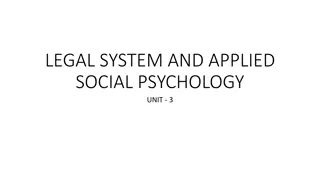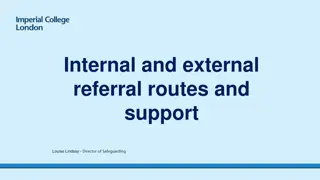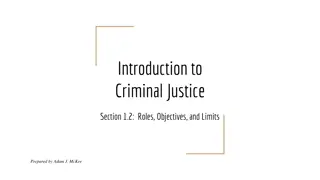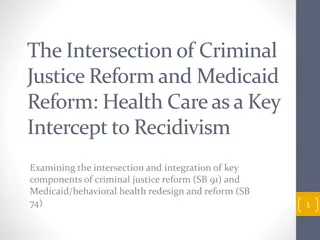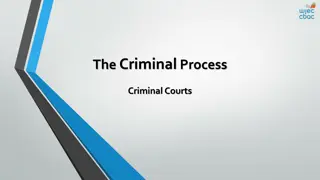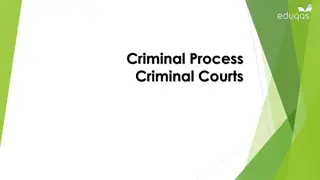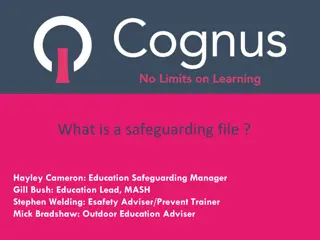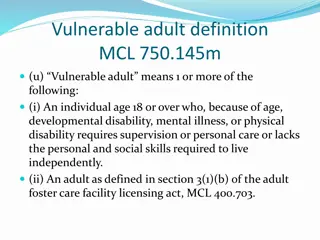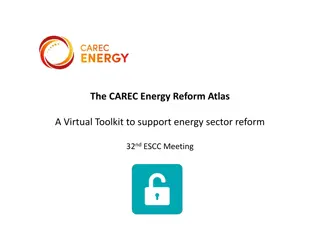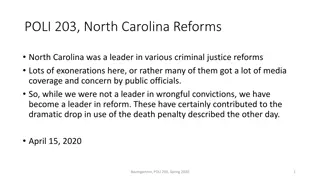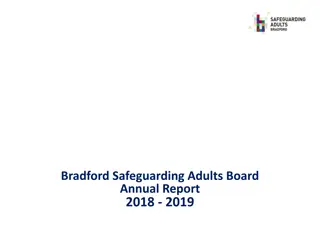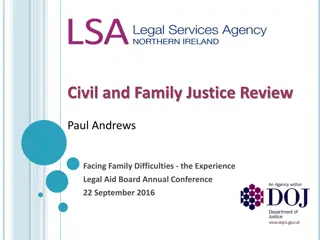Safeguarding Reform: Protecting Vulnerable Adults in the Criminal Justice System
The need for safeguarding reform in the criminal justice system to protect adults at risk from abuse and neglect is emphasized. Principles of UNCRPD, data legislation, and relevant articles are discussed, highlighting the importance of ensuring equal recognition before the law, access to justice, and protection from exploitation and abuse. Safeguarding involves promoting safety, preventing risks, and respecting the views and beliefs of vulnerable individuals.
Download Presentation

Please find below an Image/Link to download the presentation.
The content on the website is provided AS IS for your information and personal use only. It may not be sold, licensed, or shared on other websites without obtaining consent from the author.If you encounter any issues during the download, it is possible that the publisher has removed the file from their server.
You are allowed to download the files provided on this website for personal or commercial use, subject to the condition that they are used lawfully. All files are the property of their respective owners.
The content on the website is provided AS IS for your information and personal use only. It may not be sold, licensed, or shared on other websites without obtaining consent from the author.
E N D
Presentation Transcript
Decision Decision- -Making Capacity Making Capacity and the and the Criminal Justice System Criminal Justice System Safeguarding Reform: The Need for a Legal Framework Patricia T Rickard-Clarke 21 October 2020
Overview Overview (Some) Principles in the UNCRPD Data Legislation Conclusion
Safeguarding Safeguarding Safeguarding is the promotion and protection of the right to live in safety, free from abuse, harm and neglect of an adult at risk. It is about people and organisations working together to prevent and stop both the risks and experiences of abuse or neglect, while at the same time making sure that the adult s wellbeing is promoted including, where appropriate, having regard to their views, wishes, feelings and beliefs in deciding on any action .
UN Convention on the Rights of Persons with Disabilities (UNCRPD) Article 12: Equal recognition before the law State Parties shall provide for appropriate and effective safeguards to prevent abuse in accordance with international human rights law (12.4) Article 13: Access to Justice State Parties shall ensure effective access to justice for persons with disabilities on an equal basis with others .
UNCRPD UNCRPD Article 16: Freedom from exploitation, violence and abuse State Parties shall take all appropriate legislative, administrative, social, educational and other measures to protect persons with disabilities, both within and outside the home, from all forms of exploitation, violence and abuse (16.1) In order to prevent the occurrence of all forms of exploitation, violence and abuse, State Parties shall ensure that all facilities and programmes designed to serve person with disabilities are effectively monitored by independent authorities (16.4)
UNCRPD UNCRPD ( ( Article 18: Liberty of Movement and nationality State Parties shall recognise the rights of persons with disabilities to liberty of movement, to freedom to choose their residence and to a nationality, on an equal basis with others
Data Data
Vulnerable Adults in Irish Society Nationwide Public Opinion Survey RedC Dec 2016 Safeguarding Ireland Base Line Survey: 1 in 2 Irish adults claim experience of vulnerable adult abuse to either themselves (as a vulnerable adult) or somebody close to them Physical abuse of vulnerable adults has been witnessed/suspected by 1 in 3 adults in the population; this is highest within peoples private dwellings Emotional abuse is the most common of all the abuse types with over 1 in 3 having experienced this type of abuse. Lack of clarity regarding the point of contact for reporting vulnerable adult maltreatment is recognised by 1 in 3
HSE: Most common type of abuse (2018) Psychological Abuse 33.0% Physical Abuse 26.0% Financial Abuse 21.0 (over 80yrs almost 30%) Neglect (over 80s) 20% (increases with age)
Domestic Violence Domestic Violence - - 2019 2019 District Court: Application for Protection Orders, Interim Barring Orders, Barring Order and Safety Orders 2017 = 15,962 2018 = 18,572 2019 = 20,501 Observance study for 3 month period in Q2 2019 indicated about 23% of applicants were parents and/or older people
Advance Healthcare Directive Advance Healthcare Directive and Place of Care and Place of Care Red C February 2020 Red C February 2020 Safeguarding Ireland Survey: A family member or friend has the authority to make decisions about Place of Care of another person who may be frail but does have decision-making capacity and this does not require the consent of that person = 58%
Incidence of Adult Abuse Incidence of Adult Abuse in Ireland in Ireland- - RedC Oct 2020 Safeguarding Ireland Survey: Rate of Abuse during pandemic Emotional Abuse Anytime in the last 6 months More than 6 months ago (before COVID-19) RedC Oct 2020 25% 58% Psychological Abuse (threatening/coercive control/undue influence) Anytime in the last 6 months More than 6 months ago (before COVID-19) 17% 51% Most common forms of abuse both before and during the COVID-19 pandemic
Legislation Legislation
What Legislation ? (1) What Legislation ? (1) Non Fatal Offences Against the Person Act 1997 Criminal Justice (Theft and Fraud Offences) Act 2001 Criminal Justice (Withholding of Information on Offences against Children and Vulnerable Persons) Act 2012 Criminal Law (Sexual Offences) Act 2017
What Legislation? (2) What Legislation? (2) Assisted Decision-Making (Capacity) Act 2015 (ADMC Act) Domestic Violence Act 2018 Data Sharing and Governance Act 2019 No Adult Safeguarding Legislation No Social Care Legislation
Criminal Justice (Withholding of Information on Offences against Children and Vulnerable Persons) Act 2012 Section 1 definition of vulnerable person - limited to a person with a disability Schedule 2 Offences - serious offences such as murder, assault, false imprisonment, rape, sexual assault and incest An offence is committed when a person who knows or believes that one or more of these offences has been committed by another person against a child or vulnerable adult, and the person has information Culture of withholding information on many other offences and abuses no obligation to report
Criminal Criminal Law (Sexual Offences) Act 2017 Law (Sexual Offences) Act 2017 Sexual act with a protected person defined as: For the purposes of this section, a person lacks the capacity to consent to a sexual act if he or she is, by reason of a mental or intellectual disability or a mental illness, incapable of (a) understanding the nature, or the reasonably foreseeable consequences, of that act, (b) evaluating relevant information for the purposes of deciding whether or not to engage in that act, or (c) communicating his or her consent to that act by speech, sign language or otherwise Limited to a person who decision-making capacity is at issue
ADMC ADMC Act Act 2015 (2) 2015 (2)1) 1) Offences of ill-treatment and wilful neglect (Sec.145) but limited to decision supporters A person who uses fraud, coercion or undue influence to force another person to make, vary or revoke commits an offence (Sec.34, 80 + 90) If a person makes a false statement in an application for registration of an agreement commits an offence (Sec.34, 80 + 90) Investigations by Director a person who hinders or obstructs the Director in the performance of her functions (Sec.96) Limited to persons who are relevant persons for the purposes of the 2015 Act. Does not include a person who is an adult at risk and unable to protect themselves
ADMC ADMC Act Act 2015 2015 (3) (3) Personal welfare decision in ADMC Act 2015 accommodation, including whether or not the relevant person should live in a designated centre Right to Liberty: Place of Care Right under the Constitution, ECHR and UNCRPD Requires specific provision and safeguards Protection of Liberty Safeguards (proposed legislation) Appointment of nominated person Access to Independent Advocate Proposed legislation (stand alone) not confined to a relevant person for the purpose of the ADMC Act 2015
ADMC ADMC Act Act 2015 (4) 2015 (4) Legal advice and legal representation provided for an application to court under Part 5 (Sec.52) Amendment of the Civil Legal Aid Act 1995 No similar provision for a court application under any other Part of the Act No positive statement for access to legal advice No provision in any legislation for a vulnerable or at risk adult for legal representation or legal advice
Domestic Violence Act 2018 Domestic Violence Act 2018 Offence of Coercive Control A person commits an offence where he or she knowingly and persistently engages in behaviour that Is controlling or coercive Has a serious effect on a relevant person, and A reasonable person would consider likely to have a serious effect on a relevant person A relevant person for the purposes of Domestic Violence Act 2018 is: A spouse or civil partner, or Is not the spouse or civil partner, is not related within a prohibited degree of relationship but is or was in an intimate relationship Very Limited does not cover intergenerational control
Proposed Legislation Proposed Legislation
Adult Safeguarding Bill 2017 Adult Safeguarding Bill 2017 Definitions adult at risk Establishment of National Safeguarding Authority To promote the safeguarding of adults at risk and to reduce the abuse and harm of adults at risk Investigations by Authority Right of entry and inspection by authorised person To protect person To obtain personal records Mandated person To report May be required to assist Authorised Person (staff of the Authority) independent of service provider Right of access to an Independent Advocate This Bill lapsed in early 2020 end of term of Government It is imperative that these provisions are contained in legislation which has overreach into all areas of safeguarding
Adult Safeguarding Legislation Adult Safeguarding Legislation Law Reform Commission 5thProgramme of Law Reform Regulatory framework for adult safeguarding Issues paper - late 2019 Report due mid 2021 Legislative Programme September 2019 Health (Adult Safeguarding) Bill to underpin a planned national health sector policy on safeguarding vulnerable or at risk adults in the context of their interactions with the health sector RECOMMENDATION of Oireachtas Committee on COVID-19 in Nursing Homes - there should be no unnecessary delay in implementing legislation on adult safeguarding
Conclusion Conclusion Borrowing from the UNCRPD - the State has obligations to take all appropriate legislative, administrative, social, educational and other measures to protect vulnerable or at risk adults from all forms of exploitation, violence and abuse There are large gaps in legislation, practice, systems and organisations that are very costly on individual lives and do not respect the rights and dignity of the person. These gaps are also costly for the State, organisations and institutions where scarce resources are allocated to deal with the outcomes of the lack of proper and appropriate measures being in place
Thank You Thank You



